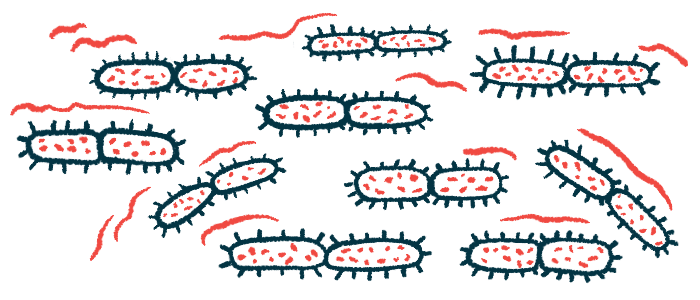Probiotic bacteria, adapted in lab, may combat P. aeruginosa infections
Compounds from helpful bacteria could be way of stopping harmful strains
Written by |

Compounds secreted by Lactobacillus, a group of bacteria commonly used in probiotics, are able to impede the growth of Pseudomonas aeruginosa isolated from the lungs of people with cystic fibrosis (CF).
That’s according to the study, “Cell-free supernatants from Lactobacillus strains exert antibacterial, antibiofilm, and antivirulence activity against Pseudomonas aeruginosa from cystic fibrosis patients,” published in Microbes and Infection.
Lung infections are a common problem for people with CF, and P. aeruginosa is one of the main opportunistic pathogens causing problematic CF lung infections. Increasingly, these bacteria are evolving and becoming resistant to commonly used antibiotics, and new treatment approaches are being explored.
Probiotics as alternative to antibiotics for P. aeruginosa infections in CF
Probiotics are live microorganisms that are thought to be beneficial for health. There’s mounting evidence that, at least in some circumstances, probiotic bacteria can help to reduce the growth of Pseudomonas. This is thought to occur because probiotic bacteria secrete compounds that interfere with the growth of the infectious bacteria.
In a medical context, use of probiotics with live bacteria is complicated because it’s difficult to standardize live bacterial products. An alternative strategy would be to determine the exact compounds made by these bacteria — sometimes called postbiotics — that can be chemically synthesized and used as medications.
“Emerging evidence points to the use of probiotic-derived active components or metabolites, also referred to as ‘postbiotics’, as a valid alternative to live bacteria,” the researchers wrote. These “microorganisms, their fragments or products released … may provide beneficial bioactivities with pharmacological potential while exhibiting several advantages over live probiotics, including safety, ease of production and storage, and multiple mechanisms of action.”
As a step towards the development of postbiotic therapies, researchers in Italy conducted a series of experiments using a cell-free supernatant derived from several strains of Lactobacillus bacteria. Cell-free supernatant is a liquid containing the molecules resulting from microbial growth and the residual nutrients used in the cell culture.
‘Rapid killing effects’ seen with supernatant from Lactobacillus strains
This work showed that a supernatant released from several different Lactobacillus strains potently inhibited the growth of Pseudomonas bacteria that were isolated from the sputum of patients with P. aeruginosa lung infections.
Strains producing a more acidic cell-free supernatant tended to have a more potent effect against Pseudomonas, and neutralizing the acid made it much less effective, the researchers noted. This finding suggests that acidity is at least partly responsible for the anti-Pseudomonas activity of a Lactobacillus supernatant.
However, a lab-made acid solution with similar acidity was not nearly as effective as the supernatant itself.
“The acid environment per se is not the only one responsible for the antibacterial effect,” the researchers wrote, adding that a “metabolite other than organic acids may account for the inhibitory effects.”
After the initial lab tests, a supernatant from the two most promising Lactobacillus strains (L. plantarum and L. rhamnosus M) was tested against Pseudomonas in an artificial sputum medium — a lab setup designed to closely mimic the environment of the human lung.
In this model, both supernatants showed “rapid and marked killing effects” against P. aeruginosa, the researchers reported. Results also indicated that their use reduced the activity of damaging molecular processes used by Pseudomonas bacteria during infections.
Further tests in an insect model also were in alignment with the idea that supernatants from Lactobacillus could protect against P. aeruginosa infections.
The possibility exists “that probiotics or their metabolites might represent a promising strategy for the prevention and/or treatment of respiratory infections,” the researchers concluded.
The team stressed, however, that much work is still to be done before a postbiotic like a cell-free supernatant might be used in clinical practice, including a detailed characterization of exactly which supernatant compounds contribute to its anti-Pseudomonas activity.







